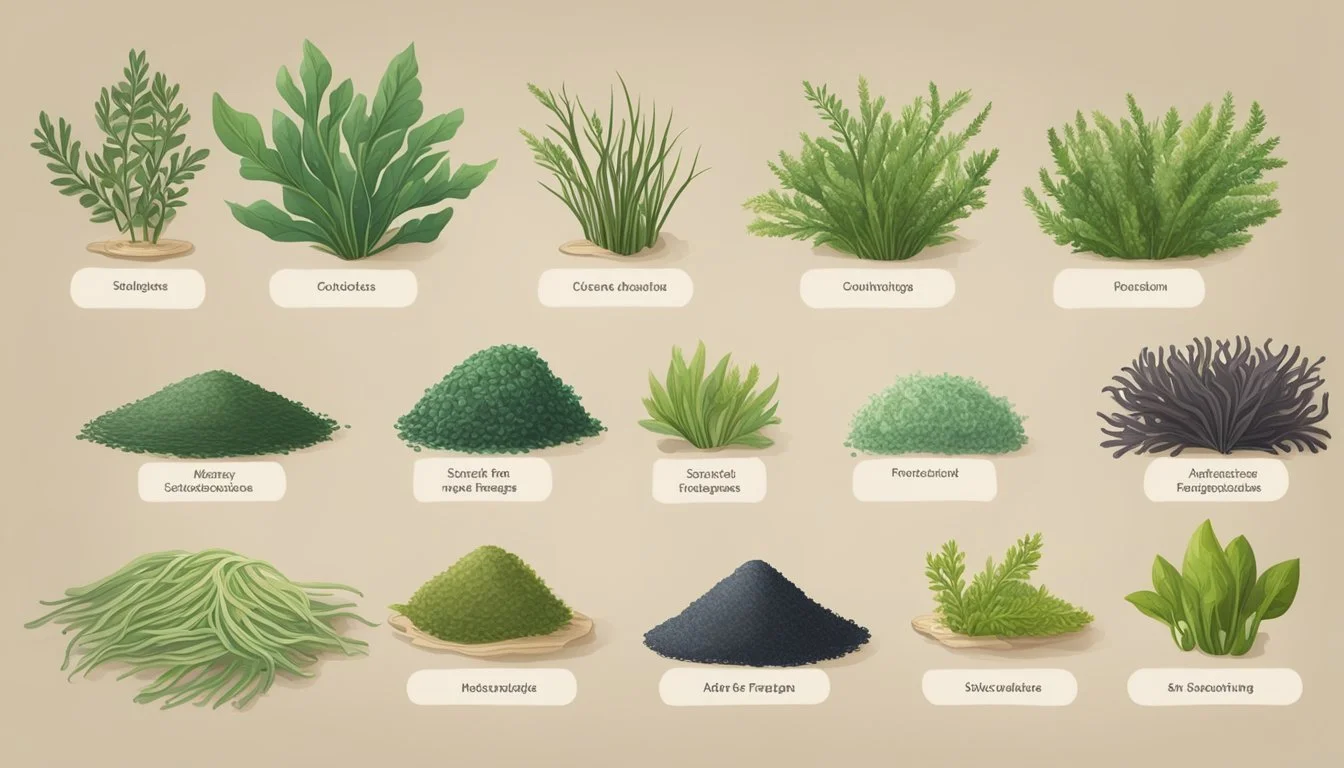Can I Eat Seaweed While Pregnant?
Understanding the Benefits and Risks
Pregnant individuals often seek to optimize their diet to support their health and the development of their baby. Seaweed, with its rich nutrient profile, is a food item that may rise to consideration during pregnancy. Seaweed is known to be a source of omega-3 fatty acids, which can contribute to fetal brain development, as well as being high in fiber, which can help maintain digestive health and alleviate common discomforts such as constipation.
While seaweed offers a myriad of health benefits, including a boost in essential vitamins and minerals, there are also potential risks to consider. The iodine content in seaweed is particularly high, which is important for thyroid function; however, too much iodine during pregnancy could pose risks. Additionally, some seaweed species might contain heavy metals or other contaminants.
Therefore, moderation and consultation with a healthcare provider are key when considering the inclusion of seaweed in a prenatal diet. Each individual's nutritional needs and circumstances differ, and thus, dietary choices should be personalized and made in the context of overall dietary intake and health status.
Nutritional Profile of Seaweed
Seaweed is a term for various species of marine algae that are renowned for their dense nutritional profile, providing essential nutrients that can be particularly beneficial during pregnancy.
Vitamins and Minerals in Seaweed
Seaweed serves as a rich source of vitamins and minerals essential for overall health. It contains vitamins A, C, E, and K, which support immune function, skin health, and blood clotting respectively. The mineral content in seaweed includes calcium, iron, magnesium, potassium, and zinc. These minerals are crucial for bone health, oxygen transport, enzyme functions, nerve signaling, and immune system health.
Iodine Content and Thyroid Health
Seaweed has high iodine levels, making it significant for the thyroid gland, which regulates hormones and metabolic processes. Adequate iodine intake supports thyroid health and prevents conditions such as hypothyroidism. During pregnancy, the body's iodine requirement increases to support fetal brain development. However, it's important to consume seaweed in moderation due to the iodine content which, in excess, could adversely affect thyroid function.
Presence of Omega-3 Fatty Acids
In addition to vitamins and minerals, seaweed is a good source of Omega-3 fatty acids, including EPA (eicosapentaenoic acid), which are critical for fetal brain development. These fatty acids are vital components of cell membranes and play a role in anti-inflammatory processes. Omega-3s are essential nutrients that the body cannot produce on its own, therefore they must be obtained through diet.
Seaweed's nutritional value lies in its concentration of essential nutrients, including fiber and protein. The fiber helps maintain digestive health, while the protein contributes to the growth and repair of tissues. Together, these nutrients make seaweed a beneficial addition to a pregnant individual's diet when consumed in appropriate amounts.
Health Benefits of Seaweed in Pregnancy
Seaweed consumption during pregnancy can be beneficial due to its nutrient-rich profile, offering a range of health benefits for both the expectant mother and the developing fetus. It is important, however, to consume seaweed in moderation and be aware of its iodine content.
Supporting Fetal Development
Seaweed is a source of essential amino acids and Omega-3 fatty acids, both important for the development of the fetal nervous system. These nutrients are critical in forming the physical and cognitive structures that will support a child's future growth. Additionally, the adequate intake of fiber present in seaweed can help prevent constipation, a common concern during pregnancy.
Enhancing Maternal Well-being
For mothers, the antioxidants found in seaweed can help in reducing oxidative stress, which is key in maintaining overall well-being. Seaweed's contribution to female fertility is noteworthy, as it supports the functioning of sexual organs. Additionally, the vitamin B-12 in seaweed is essential, especially for those on a plant-based diet, and may play a role in mitigating depressive symptoms by contributing to the synthesis of neurotransmitters linked to mood regulation.
Safety Considerations for Seaweed Consumption
When considering seaweed as part of a prenatal diet, safety and adherence to dietary guidelines are crucial. Specific risks like heavy metal contamination must be weighed against the established safe consumption practices.
Risk of Heavy Metal Contamination
Seaweeds can accumulate heavy metals such as mercury and arsenic from their marine environment. These elements can lead to complications if consumed in large amounts. Pregnant women should be aware that mercury exposure can affect fetal brain development. Arsenic, on the other hand, even at low levels, is associated with birth defects and developmental delays. The Food and Drug Administration (FDA) advises pregnant women to monitor their seafood consumption to avoid these heavy metals, and by extension, this advice applies to seaweed.
Safe Dietary Guidelines
To consume seaweed safely during pregnancy, one should follow the Dietary Guidelines for Americans, which suggest varied and balanced nutrition. A key point includes:
Moderation: While small quantities of seaweed can be beneficial due to high nutrient content, it is wise to consume it in moderation to avoid excessive iodine intake.
The FDA does not provide specific guidelines for seaweed but offers general food safety recommendations. Pregnant women can apply these principles to seaweed by:
Ensuring Quality: Opt for reputable sources that test for contaminants.
Limiting Consumption: Stay within the recommended dietary guidelines for seafood intake, considering that seaweed forms part of this category.
Different Types of Seaweed and Usage
Seaweed varieties are diverse in their nutrient profiles and culinary applications, providing beneficial nutrients when included in a pregnancy diet with consideration for moderation and diversity.
Brown, Red, and Green Seaweed Varieties
Brown Seaweed: Comprised of species like kelp, wakame, and arame, brown seaweed is notable for its iodine content. Kelp is a commonly consumed brown seaweed known for its high mineral content and is often found in Asian cuisine.
Kelp: Rich in iodine, used in soups and stews.
Wakame: Frequently used in seaweed salads, contains vitamins and minerals.
Arame: A sweeter variety, often added to dishes for its iodine content.
Red Seaweed: This category includes varieties such as nori and dulse. Nori, often used in sushi, is rich in protein and vitamins.
Nori: Staple in sushi rolls, rich in protein.
Dulse: Chewy texture, used for its flavor in snacks and soups.
Green Seaweed: Green seaweeds like ulva (also known as sea lettuce) are consumed for their light, fresh taste and nutrient-rich profiles.
Ulva: Known as sea lettuce, used in salads and soups.
Incorporating Seaweed into the Diet
Seaweed can be incorporated into a diet in various forms, ranging from fresh to dried. It is vital for pregnant women to source seaweed from reputable suppliers to avoid contaminants.
Fresh seaweed: for salads and soups.
Dried sheets: nori for sushi.
Flakes: to garnish or as a salt substitute.
Supplements: in controlled doses for specific nutrient intake.
Asian Cuisine: Seaweed is often used in Asian culinary traditions. It can be found in miso soup with kombu, a kelp variety, seaweed salads using wakame, and sushi rolls wrapped in nori.
Usage:
Seaweed salad: typically made with wakame.
Sushi: using nori sheets.
Soups: kombu or kelp to add umami flavors.
In any use, moderation is key, as excessive intake of certain seaweeds may lead to an overconsumption of iodine or other minerals.
Recommendations for Moderation and Balance
When consuming seaweed during pregnancy, it is essential for an individual to monitor their intake of nutrients, particularly iodine and sodium, to maintain a healthy balance.
Moderating Iodine and Sodium Intake
Seaweed is high in iodine, a critical nutrient for fetal development, especially brain development. However, excessive iodine may lead to thyroid dysfunction, so moderation is key. Pregnant individuals should aim for a dietary iodine intake that meets but does not exceed the recommended levels. Foods like fish, milk, and eggs can also contribute to one's daily iodine intake.
Regarding sodium intake, some seaweed varieties can have high levels, potentially contributing to high blood pressure. It's advisable to:
Check labels for sodium content.
Limit the intake of seaweed products high in sodium.
Rinse seaweeds before consumption to reduce sodium levels.
Alternative Sources of Nutrients
While seaweed is a potent source of nutrients, pregnant individuals can obtain these from alternative sources to ensure healthy eating patterns. For omega-3 fatty acids, which are beneficial for fetal brain development and may also support breastfeeding to boost milk supply, alternatives include:
Anchovies
Herring
Sardines
For iodine, besides seaweed, suitable alternatives are:
Fish: Choose varieties low in mercury.
Milk: A good source of iodine, as long as it's pasteurized.
Eggs: Preferably organic or enriched with omega-3.
Potential Allergies and Individual Sensitivities
When considering seaweed as part of a pregnancy diet, the individual's allergic history and sensitivities should be taken into account. Seaweed can trigger reactions in those with pre-existing allergies, particularly to iodine or seafood.
Individual Sensitivities: Pregnant women may experience heightened sensitivities due to hormonal changes. Seaweed contains iodine, which in excessive amounts could lead to thyroid imbalances. It is crucial for individuals to monitor their reaction to seaweed and adjust their intake accordingly.
Food Allergies: While seaweed is not a common allergen, it could harbor allergens like fish and shellfish particles depending on how it is processed. Those with known allergies should ensure the seaweed they consume is free from contaminants.
Pre-Menstrual Syndrome (PMS): Pregnant women who typically experience PMS may find that certain foods, including seaweed, can potentially exacerbate symptoms due to its high sodium content. Monitoring intake to manage such sensitivities is advisable.
Women who have never experienced allergies to seafood or iodine previously, may still want to introduce seaweed cautiously into their diet and observe for any adverse reactions. It is also recommended to consult healthcare professionals when incorporating new foods during pregnancy.
Impact on Postpartum Recovery
Including seaweed in the diet during postpartum recovery may offer benefits due to its nutritional content. Seaweed is a source of fiber, which can aid in digestion and alleviate issues like constipation, common after childbirth. Fiber also supports satiety, which can be helpful in managing weight after pregnancy.
Seaweed is known for its iodine content, which is crucial in maintaining healthy thyroid function. Proper thyroid activity is essential for a mother's overall well-being and energy levels during postpartum recovery. Additionally, seaweed provides omega-3 fatty acids, important for emotional health and, as some studies suggest, may be beneficial for the neurological development of the breastfeeding infant.
Postpartum mothers may find the vitamin B-12 in seaweed useful, especially if their dietary intake is limited in animal products. Vitamin B-12 plays a significant role in the maintenance of nerve cells and red blood cells.
For breast milk production, certain cultural practices recommend foods like pork vinegar soup, which is sometimes made with seaweed. The belief is that such soups can help to rejuvenate the postpartum body and improve milk supply, although clinical evidence to confirm this is limited.
It’s important to note that the consumption of seaweed should be in moderation due to the potential for high levels of iodine and heavy metals, which might be harmful. Women with a history of breast cancer should consult with a healthcare provider, as certain types of seaweed may contain estrogen-like compounds that may not be recommended in large amounts.
Environmental and Ethical Considerations
When considering the consumption of seaweed during pregnancy, one must be mindful of the environmental impact and ethical considerations. Seaweed, often lauded as a superfood due to its rich nutrient profile, should be sourced sustainably to minimize the ecological footprint.
Sustainable Sourcing: Sustainably-sourced seaweed ensures the long-term viability of marine ecosystems. Buyers should look for certifications or labels that attest to responsible farming or harvesting practices.
Environmental Impact:
The farming of seaweed can provide environmental benefits, such as absorbing carbon dioxide and improving water quality.
Overharvesting can disrupt local ecosystems and deplete natural seaweed populations.
Ethical Considerations: Consumers should consider the ethical ramifications of their food choices.
Bycatch:
Harvesting seaweed may inadvertently affect marine life, including endangered species.
Seaweed farmers and harvesters should employ methods that do not harm other marine animals, such as sharks.
Superfood Misconception: While seaweed is nutritious, consumers should be wary of superfood labels that can be misleading or imply exaggerated health benefits.
Mislabeling:
Products labeled as superfoods like seaweed may not always offer significant advantages over a balanced diet.
Seaweed's role in a diet during pregnancy is better understood when also acknowledging the importance of these broader environmental and ethical aspects. As seaweed becomes more popular, prioritizing sustainability and ethics will help protect the planet and its inhabitants while providing for human health needs.








